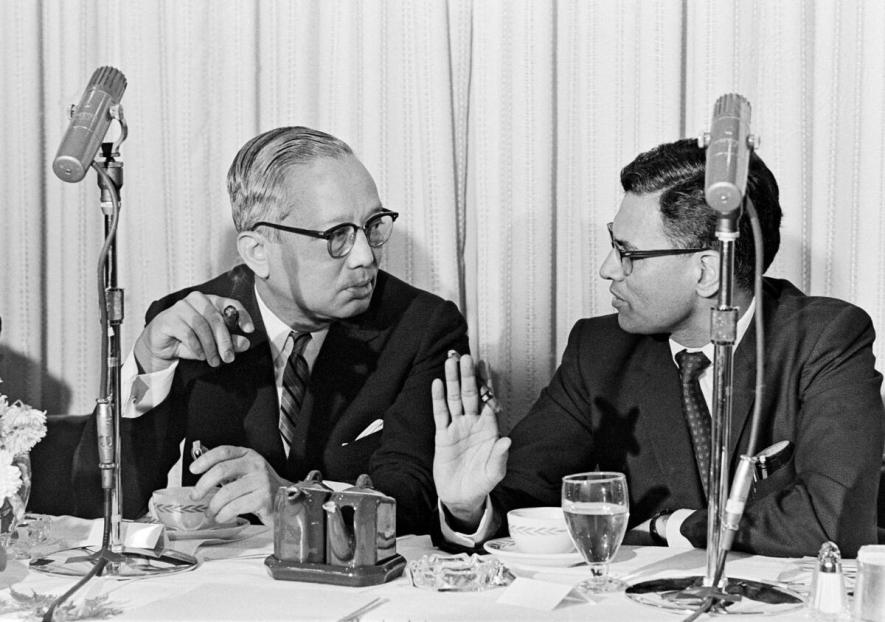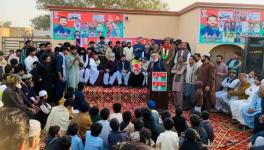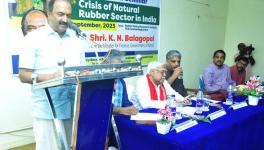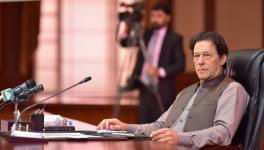OBITUARY: Chakarvathi Raghavan -- The Man who Warned us About Recolonisation

Secretary-General U Thant (left) conversing with Chakravarti Raghavan of the Press Trust of India, 1967
The first time I had dinner with Chakarvarthi Raghavan was, with his wife Kalyani, in his apartment in Geneva (Switzerland) about 20 years ago. He placed me in a chair near him and told me story after story about his time as the Editor-in-Chief of the news agency, Press Trust of India (PTI). Those were important years – 1971-1976 – during which press freedom came under strain, particularly after Prime Minister Indira Gandhi declared an Emergency in 1975. Raghavan had worked for the PTI since the formation of India in 1947. He cut his teeth covering politics in the country before going to New York for a decade from 1962 to 1971 as the PTI’s Special Correspondent. I was happy to sit next to his legend, listening to his stories, learning about journalism.
Raghavan despised authority, particularly unchecked political power. The culture of obsequiousness that had developed around Prime Minister Indira Gandhi and her inner circle bothered him. PTI, being a non-governmental agency, nonetheless had an air of officialness about it, a reverence that allowed Raghavan to test the limits of political power.
His most famous story - investigated by the PTI’s science correspondent KS Jayaraman - was about the 1974 experiments conducted by the CIA in India with forms of biological warfare. The dogged reporting by Raghavan and Jayaraman led to Indira Gandhi closing down the project. Decades later, Raghavan remained proud of this story.
In August 1975, Raghavan was summoned by the Minister of State for Information and Broadcasting – Vidya Charan Shukla – for ‘consultations.’ Shukla asked Raghavan to set up a government news agency; but Raghavan refused with a nasty joke about authoritarianism, which – he told me – was his downfall. Nonetheless, the government put out an ordinance in December 1975 to create such an agency, although it was squelched by the intervention of a few people in Gandhi’s cabinet (including Jagjivan Ram).
As retaliation against Raghavan and PTI, the All-India Radio ended its contract with PTI and with United News of India, effectively depriving them of revenue. Raghavan, along with Kuldeep Nayar, Nikhil Chakravarty and others, had been very vocal against the Emergency. In December 1976, his refusal to agree to Shukla’s proposal and his outspokenness led to his termination from PTI. The orders, he said, came from either Indira Gandhi or her son, Sanjay Gandhi. The PTI management told him that he could go to Bhubaneshwar to report on social and cultural news. Raghavan knew that this was a way to silence him. He did not accept. The door to PTI closed for him.
Not long after, Raghavan left India for Geneva. While he was the PTI’s Special Correspondent at the United Nations, he had become the President of the UN Correspondents Association in 1967. This brought him into contact with a range of reporters and editors who worked in and around the United Nations.
In 1975, at the side-lines of the UN General Assembly session in August-September, the Dag Hammarskjold Foundation held a seminar on its report, What Now? Another Development. Raghavan had reviewed the report for PTI. That review and his contacts in New York brought him to participate in a seminar of Third World journalists.
At that meeting, Raghavan met Merc Nerfin, a Swiss journalist who had written the Dag Hammarskjold report. The conversations at the seminar circled around the New International Economic Order (NIEO), which had passed the General Assembly in 1974. NIEO had urged the international community to reshape the world order around the needs of people over profit, with an eye to the creation of institutions to further human well-being (notably in education and health care) and to the creation of regulatory bodies to constrain the profit-motive. The participants at the seminar agreed to a strong declaration, which included this: “The New International Economic Order requires a new framework of world information and communications.”
Nerfin had been the President of the International Foundation for Development Alternatives (IFDA) and the Vice President of Inter Press Services (IPS). Inspired by the seminar’s call for a “new framework,” Nerfin asked IFDA to publish the Special United Nations Service (SUNS) from March 1980. This was a daily news bulletin that would provide reliable news from the UN system and about the world.
Two key phrases marked the work of SUNS – ‘the Third World point of view’ and ‘South-South cooperation.’ Raghavan joined Nerfin in Geneva, initially as correspondent for IPS and with IFDA from 1978 to 1990. He would eventually take over SUNS when IFDA could no longer finance it. Not a day went by when SUNS was not to be found on the front table of the UN missions of the governments of the G77 states. It was the principal hub of information from a Third World point of view to enhance South-South cooperation, read by a range of people including diplomats and activists.
The publication of SUNS coincided with the release of the MacBride Report in 1980 from the UN Educational, Scientific, and Cultural Organisation (UNESCO). From its founding in 1945, UNESCO had been tasked with the democratization of communications. Any attempt to advance these issues, Raghavan told me, was met by anti-communist virulence by the US government. In fact, when the draft of the MacBride report came out in 1979, the US media organisations pilloried it for seeking to create a New World Information and Communication Order.
Nothing in the report was outside the kinds of debates Raghavan and Nerfin had led in the lead-up to the launch of SUNS: communication is a fundamental right; imbalances in the news structure had to be addressed; communications had to be sensitive to both cultural identities and individual rights; national communications plans had to be integrated into development projects; the New World Information and Communications Order had to advance the objectives of the NIEO. “The MacBride Report should have led to deeper debates about the need for a more credible communications system,” Raghavan told me. Instead, it was set aside, and the information order favoured the interests of corporate wealth and the capitals of the North.
In 1980, Raghavan took the reins of SUNS, shortly afterwards renaming it the South-North Development Monitor SUNS. These bulletins were the only place where one could follow the debates around development and trade policy. Few newspapers had the capacity to train journalists to follow international trade debates, and fewer papers from the South could station journalists in Geneva (as well as Brussels, Rome, Paris, and New York). SUNS, as a kind of wire service of the South, was able to do the job for them.
Raghavan was the person who seemed to be in every important trade meeting, and he showed us how to write about the complexity of North-South trade debates in a way that broke through the jargon and laid out the main issues on the table. He spent the next two decades following the shenanigans at the General Agreement on Trade and Tariffs (created in 1948) and the UN Conference on Trade and Development (created in 1964). He watched the national development agenda of the Bandung Spirit be undermined by the countries of the North, as they used their power to rewrite trade rules and prevent regulatory frameworks from being established. This reportage from Raghavan was crucial.
In the 1980s, Raghavan alerted us to a sly manoeuvre taking place in the trade negotiations. The Northern trade representatives had begun to argue against the established form of intellectual property rights, namely that the patents could only be for the process of production and not the product itself (process-based patents). This meant that Southern states could reverse engineer any pharmaceutical drug, for instance, and produce it without rent if they used a different process.
In the Uruguay Round of the GATT from September 1986, the Northern representatives argued for a new set of policies – Trade-Related Aspects of Intellectual Property Rights (TRIPS), which would reverse the patent protection to cover the product and not the process. This would prevent reverse engineering and would condemn states of the South – by and large - to being consumers of Northern products. When confronted by the arguments of these Northern trade representatives, Raghavan wrote that they are mistaking the word “rights” for the word “privileges”; these are intellectual property privileges because they are given to companies by States through an act of law.
It was thanks to Raghavan that across the Global South movements began to grow against the new kind of piracy grounded in such shifts in international law. Third World states, weakened by the debt crisis, simply did not have the material independence nor the courage to stand up against the pressure from the Global North.
In India, texts by the Delhi Science Forum and The National Working Group on Patent Rights, as well as texts from the Malaysia-based Third World Network (edited by Raghavan’s friend Martin Khor), enlightened us about what was happening. I remember reading and re-reading P. Sainath’s fantastic A Layperson’s Reader on Intellectual Property Rights (Bombay: Indian School of Social Sciences, 1991), and sitting with Amit Sengupta in the Delhi Science Forum office to jointly despair at the direction of these new rules.
When I first met Raghavan a few years later, I told him about how much his work meant to those of us in the trenches against the new kind of globalisation, which he called – when he won the Group of 77/UNDP Award in 1997 – “the active neo-mercantilism of the powerful countries lurking behind the rhetoric of neoliberalism and globalization.” The argument he had been making since 1986 would shape his landmark book, Recolonization: GATT, the Uruguay Round, and the Third World (London, Zed Books, 1990).
The foreword to Recolonization was written by Julius Nyerere, the former President of Tanzania, and the Chair of the South Commission (1987-1990). In a few pages, Nyerere wrote about the implications of globalisation and neoliberalism, the reality that a new international economic order would be created, but one that would be the very opposite of the NIEO. Raghavan’s book, Nyerere wrote, will be “welcomed by genuine internationalists as an alert signal – warning of an attempt to perpetuate and extend the inequities of an international economic structure which is already leading to misery, hunger, ignorance, and death in the Third World.”
This book, he wrote, “can contribute to the struggle against the serious danger which threatens future world stability and peace.” The South Commission report – The Challenge to the South (London: Oxford University Press, 1990) came out that same year. Raghavan had helped – behind the scenes – with the Commission, including writing a paper called “Recolonization,” which was the basis of his 1990 book.
That was in 1990. Nothing stopped for Raghavan. For the next three decades, he would fight to defend the rights of the peoples of the South to have a trade and development agenda that benefitted them and not those who sucked the world dry for their own profit.
His articles for SUNS and from Third World Resurgence would be published in dossiers made by anti-globalisation activists and would be distributed to the smell of tear gas in Seattle or to the hum of air conditioners at the Doha conference centres. All of us read him because he summarised for us the essential points of the attack on the South in the arcane negotiations at a range of place, such as UNCTAD meetings and at meetings of the Intellectual Property Coalition.
In 1992, he wrote me a long letter, angry that the US administration of Bill Clinton had forced the shutting down of the UN Centre on Transnational Corporations, set up by in 1975 as part of the NIEO process to keep an eye on these cross-border behemoths that had begun to override states and drive their policy agenda.
I would joke with Raghavan about my frequent trips to Geneva, which always resulted in several sessions drinking tea with Raghavan and Kalyani. I would say: “I come to visit you both and to eat at Café de Paris” (whose beef steaks would make Raghavan shudder)!
Whenever I came to report from the UN or to speak there, Raghavan would grill me about each encounter I had, every idea I learnt. He was hungry like that. When I was digging through the South Commission archives, now sadly destroyed, it was Raghavan who guided me along with Branislav Gosovic, Devaki Jain, S. P. Shukla, R. Krishnamurti, and others (that work became part of my book The Poorer Nations: A Possible History of the Global South, which could not have been written without the work of people such as Raghavan).
It is not enough to say that a generation has slipped away. Raghavan’s stubbornness to adhere to the basic values of the UN Charter defined him. He was not going to allow the tide to carry him away. Even now, as he slipped into the darkness on September 26, he leaves us with that anchor in the hope that we carry forward his obstinacy for reason, for truth, and for humanity.
Get the latest reports & analysis with people's perspective on Protests, movements & deep analytical videos, discussions of the current affairs in your Telegram app. Subscribe to NewsClick's Telegram channel & get Real-Time updates on stories, as they get published on our website.
























